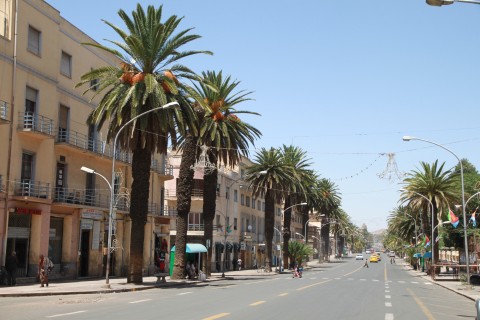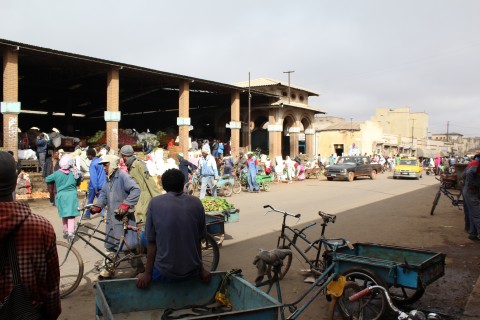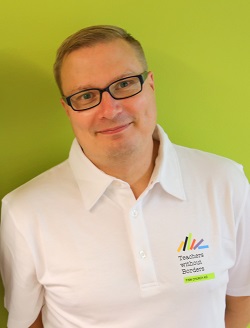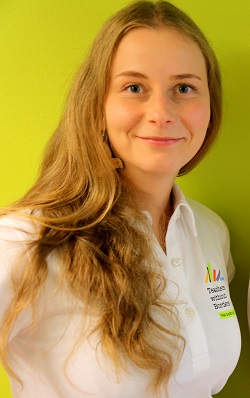Teachers without Borders volunteers in Eritrea
It only takes some 13 hours to get to Asmara from the Helsinki Airport in Finland. Yet, Finland and Eritrea are located on the same time zone. It is perhaps more accurate to measure the actual time difference between the two countries in decades rather than hours.
The city of Asmara is characterised by charmingly beautiful buildings dating to the era of Italian colonial rule. Internet connection works sporadically, and not everything one is used to having back home is readily available. For example, there are no ATMs in the country. Instead, however, there is overwhelming hospitality, great sense of humour, and one of the safest and cleanest city milieus in Africa.
The first days have been busy with getting to know the new surroundings and meeting new people. At our working campus, we have met most of the teachers and toured around the site. Working conditions are, of course, quite different from what we have in Finland. Thus, what works in Finland might not work in Eritrea, and at the beginning we’re eager to learn from our Eritrean colleagues. In a good partnership with them, we will have opportunities to share our best practices.
 There are two teacher training institutions in Eritrea. FCA education specialist Hanna Posti-Ahokas works at the one which is part of the Eritrean Institute of Technology. We, the two Teachers without Borders education experts, work at the Asmara Community College for Education (ACCE). The two institutions are administratively separate, but there is lively cooperation between them.
There are two teacher training institutions in Eritrea. FCA education specialist Hanna Posti-Ahokas works at the one which is part of the Eritrean Institute of Technology. We, the two Teachers without Borders education experts, work at the Asmara Community College for Education (ACCE). The two institutions are administratively separate, but there is lively cooperation between them.
Initially, the focus will be on observing the teaching at ACCE. There is an on-going process of revising the curriculum for Diploma level teacher training, where our input is also desired. We will participate in different departments’ planning meetings and learn from their expertise as well as discuss the curriculum together with them.
Furthermore, earlier this year the ACCE has started a secondary high school level education programme aiming to educate more motivated teachers into the Eritrean education system. The challenge here, just like in so many other countries, is that the teaching profession is not nearly as prestigious and respected as it is, for example, in Finland. It is amazing how committed and motivated our local colleagues — teachers and other education professionals — are despite this.
Now, in the very beginning, one is immersed in all that is new; names, faces, places, voices and scents. Being awakened by roosters crowing in the heart of the capital and inhaling the delicious odour of freshly baked bread during the morning run make for a great start for the day.
Everything has gone smoothly, and there is undoubtedly a memorable time ahead of us. So here we go! It feels great to get started.
Observing classes
 The Asmara Community College of Education provides education to both high school students and teacher trainees. Also, teachers who wish to update their diploma participate in the one-year programme. This means that over two hundred diligent students in total are on campus every day.
The Asmara Community College of Education provides education to both high school students and teacher trainees. Also, teachers who wish to update their diploma participate in the one-year programme. This means that over two hundred diligent students in total are on campus every day.
This week, we have been observing classes every day and so far have participated in English, biology and geography classes. It is wonderful to see the excitement glimmering in the eyes of teachers as they talk about the movements of tectonic plates in the lithosphere, the characteristics of life or English grammar, in other words the exact same things that are taught and studied in Finland. Even though conditions here in Eritrea are quite different from those in Finland, the joy of learning is universal.
Later on, we are going to visit local primary schools and see the practical results of the teacher training programme. One thing is certain: most students are eager to go to school. This becomes evident during our morning jog when, before seven o’clock, we meet flocks of smiling little school children in their green uniforms headed for their first classes of the day.
We will also have the chance to teach biology to high school students ourselves. It is perhaps easier to assess which methods work best in practice and which don’t once we have tested them personally. It is also more fruitful to discuss which methods to use with colleagues after you have tried them out yourself in a local context.
We have, then, a most interesting week going on here and possibly even more interesting ones ahead!
From sunny Asmara, over and out,
Katri Meriläinen and Jukka Tulivuori
Jukka Tulivuori has over 15 years of experience as an educator, and holds an MA in education and an MSc in geography, biology and health education. His MSc thesis addressed ICT in Geography Education. He currently works at the Finnish National Board of Education (part of the MoE), Helsinki, as a Counsellor of Education focusing on Learning Environments, ICT in Learning and Teaching, Biology and Geography in General Education, and Environmental Education. He is a published author in education and has produced curricula and online materials about environmental education.
Katri Meriläinen holds an MA in Teacher Education and specialises in English and Biology. She offers diverse experience in teacher education and integration of the arts in learning. Meriläinen specialises in pedagogical uses of information and communication technologies. Her passion for teacher education has led her to pursue international opportunities, and in 2009 she worked on developing an education programme for street children in Kolkata, India. Recently, Meriläinen has completed courses in Global Education and Education Quality Assessment.


